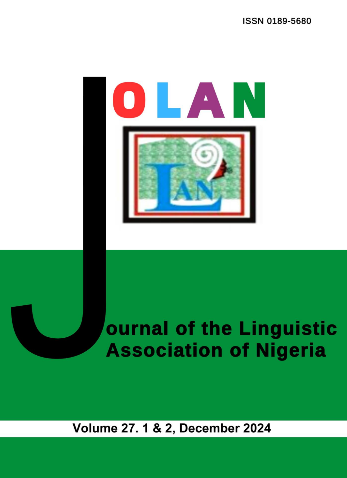More on WH- Questions in Awori dialect of Yoruba
Keywords:
Wh-movement, Government, Binding Theory, Awori dialect, Constituent questions, Move alpha ruleAbstract
As the research works progress deep in the study of dialects, not much work has been done on Awori, a dialect spoken in Lagos and Ogun States of Nigeria. The existing works on classification of Yoruba dialects fail to recognize Awori among the dialects around it like Yewa, Ketu and Anago. The exposition that Awori has so many features which differentiate it from the neighbouring dialects is a feat yet to be achieved. This work is in complement of the one published in 2012. The data for the study were gathered from Igbe̩sa, Ò̩ta, Agege, Ilogbb Eremi in both Lagos and Ogun States. This work employs Wh-movement transformational rule in Government and Binding Theory (GB) known as move alpha rule to analyze wh-questions. It also shows the nature and the existence of wh-questions in the adjective numerals, verb phrases, conjunctions, adjective phrases, focus sentences, and negative sentences of Awori dialect. The work shows that thorough analysis of syntactic elements in different dialect can be used to set it as distinct from other dialects around it. This study also maintain that each dialect deserves to be studied thoroughly as insights from it will point to issues in the standard language.
Abstract in Awori
Bi isé͎ iwadidi s͎e ń́ jinlè͎ si i ninn awo͎n è͎ka ede ilè͎ Yoruba, kb ti i si isé͎ pnpò͎ to bé͎è͎ lori è͎ka ede Awori – è͎ka ed̀e kan ni ipilè͎ Ogun ati Eko ni ilè͎ Naijiria. Awo͎n is͎e͎ to wa nilè͎ lori awo͎n ipinsisò͎ri è͎ka ede Yoruba paapaa kan ko è͎ka ede yii pò͎ mó͎ awo͎n è͎ka ede to wa ni agbegbe rè͎ bii Yewa, Anago ati Ketu bi i pe ò͎kan naa ni wó͎n. Akiyesi kan pataki ni pe è͎ka ede Awori ni awo͎n abuda to pò͎ re͎pe͎te͎ to fi yatò͎ si awo͎n è͎ka ede agbegbe rè͎. Koko yii ti awo͎n olus͎ewadii b ti i s͎ò͎rò͎ nipa è͎ rara jé͎ alafo kan ti o wa ninn is͎é͎ iwadii awo͎n eka ede Yoruba. Ohun ti is͎é͎ yii gun le gan–an niye͎n, o si jé͎ afiknn si is͎é͎ iwadii Aina (2012). A gba awo͎n deta ti a lb fnn iwadii yii ni Igbe̩sa, Ò̩ta, Agege, Ilogbb Eremi ni ipinlè͎ Eko ati ipinlè͎ Ogun. Is͎e iwadii yii s͎e amnlb awo͎n bfin idaro͎ ató͎ka as͎ebeere ta (Wh-movement transformational rule) ti a mò͎ si gbe alfa lati fi s͎atnpalè͎ awo͎n gbolohun ató͎ka as͎ebeere wò͎nyi. Is͎é͎ yii s͎afihan irisi ati ihun ató͎ka as͎ebeere ninn è͎yan as͎onka, apola is͎e, ihun asopò͎, apola è͎yan, awo͎n gbolohun ate͎numó͎ ati gbolohun iyisodi ni è͎ka ede Awori. Iwadii yii fihan pe atnpalè͎ jijinlè͎ lori awo͎n ihun sinntaasi è͎ka ede kò͎ò͎kan ni yob jé͎ ka mo͎yi iyatò͎ to wa laaarin è͎ka ede kan ati awon to ku lagbegbe re͎. Is͎é͎ yii tnn te͎nu mo͎ pe è͎ka ede kò͎ò͎kan lo po͎ndandan pe ka yè͎ é͎ wb finni finni nitori awo͎n arifayo͎ kan tabi bmiran ninn è͎ yob tó͎ka si awo͎n abajade kan ninn ede Yoruba ajumò͎lo.
References
Abó̩de̩rin, O.A. (1995). Ò̩na Is̩è̩da Gbolohun Ibeere ninn È̩ka Ede Yoruba: Unpublished M. A. Thesis, O̩bafé̩mi Awoló̩wò̩ University
Abó̩de̩rin, O. A. and Y. A. Babatunde (1997). Wh-movement and subjancency in Yoruba. Journal of Educational and Humanistic Studies Arts. University of Ibadan. 12, 17-19.
Adetugbo, A. (1967): The Yoruba language in western Nigeria: Its major dialect areas - Ph.D Thesis, University of Columbia.
Adetngbò̩, A. (1982). Towards a Yoruba dialectology. In A. Afolayan (Ed.), Yoruba Language and Literature (207-214). University Press Limited
Aina, A. (2008). Ofin iye̩ra fnn iranmnpe Ninn È̩ka Ede Awori. Paper presented at the Yoruba Studies Association of Nigeria, (YSAN) Conference 10/2018. AgoIwoye.
Aina, A. (2012). Silebu e̩lé̩yò̩ó̩rodb afagun ninn è̩ka ede Awori. Agó̩ Iwoye .Journal Of Languages and Literatures, 2, 42-55.
Aina, A. (2012). WH-movement in Awori dialect of Yoruba. Orisun: Journal of Religion and Human Values, 2(2), 57-75
Akanbi, T. A. (2016). On the WH particle [wo] in Yoruba. European Scientific Journal 12(17): 414-427
Awobulnyi, O. (1978). Essentials of Yoruba Grammar. University Press Limited.
Awobulnyi, O. (1999). Aspects of contemporary standard Yoruba in dialectological perspective. Isò̩la, A. (Ed.), New findings in Yoruba studies, J. F. Odunjo Memorial Lecture series, 3, 1 – 79.
Awobulnyi, O. (1998). “Awo̩n Eka Ede Yoruba”. Paper presented at Yoruba Studies Association of Nigerian Conference 10/1998. Ibadan
Bamgbos̩e A. (1990). Fonó̩ló̩ji ati Girama Yoruba: University Press Limited.
Chomsky, N. (1957). Syntactic structures: Mouton.
Chomsky, N. (1965). Aspects of the theory of syntax: MIT Press.
Chomsky, N. (1981). Lectures on government and binding. Foris Publications.
Haegeman, L. (1991). Introduction to government and binding theory.
Basil Blackwell Horrocks, G. (1987). Generative grammar. Longman.
Ndimele, O. M. (1992). The parameters of universal grammar: A government and binding approach. African Educational Services.
Ojo, A. T. (2022). Comparative Analysis of Wh-Question Markers in Standard Yoruba and Ijesha Dialect. Nigeria Journal of Arts and Humanities 2(1), 47-54
Olumuyiwa, T. O. (2015). Yoruba Interrogative proverbs European Scientific Journal, 8 (29),105-120
Ouchalla, J. (1994). Introducing transformational grammar: From principles to parameters. Edward Arnold.
Omolewu, O. C. (2017). Wh-movement construction in Egba dialect. ALOPE: Ilorin Journal of the Humanities, 26, 60-79.
Radford, A. (1988). Transformational grammar. Cambridge University Press
Yusuf, O. (1997). Transformational generative grammar: An Introduction. Shebiotimo Publication.
Yusuf, O. (1998). Fundamentals of syntax and the study of Nigerian languages. Shebiotimo Publications














